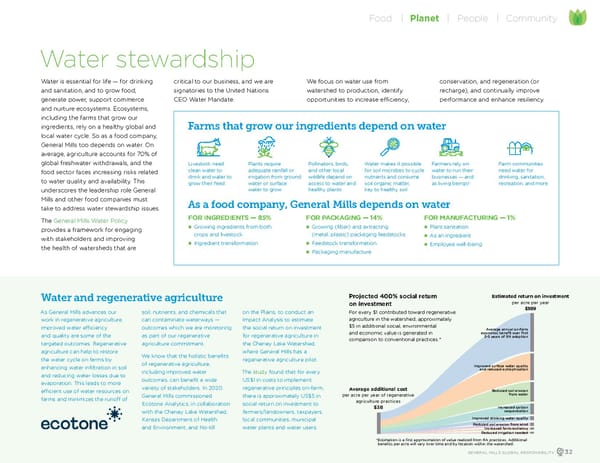Water is essential for life — for drinking and sanitation, and to grow food, generate power, support commerce and nurture ecosystems. Ecosystems, including the farms that grow our ingredients, rely on a healthy global and local water cycle. So as a food company, General Mills too depends on water. On average, agriculture accounts for 70% of global freshwater withdrawals, and the food sector faces increasing risks related to water quality and availability. This underscores the leadership role General Mills and other food companies must take to address water stewardship issues. The General Mills Water Policy provides a framework for engaging with stakeholders and improving the health of watersheds that are critical to our business, and we are signatories to the United Nations CEO Water Mandate. We focus on water use from watershed to production, identify opportunities to increase efficiency, conservation, and regeneration (or recharge), and continually improve performance and enhance resiliency. Water stewardship As General Mills advances our work in regenerative agriculture, improved water efficiency and quality are some of the targeted outcomes. Regenerative agriculture can help to restore the water cycle on farms by enhancing water infiltration in soil and reducing water losses due to evaporation. This leads to more efficient use of water resources on farms and minimizes the runoff of soil, nutrients, and chemicals that can contaminate waterways — outcomes which we are monitoring as part of our regenerative agriculture commitment. We know that the holistic benefits of regenerative agriculture, including improved water outcomes, can benefit a wide variety of stakeholders. In 2020, General Mills commissioned Ecotone Analytics, in collaboration with the Cheney Lake Watershed, Kansas Department of Health and Environment, and No-till on the Plains, to conduct an Impact Analysis to estimate the social return on investment for regenerative agriculture in the Cheney Lake Watershed, where General Mills has a regenerative agriculture pilot. The study found that for every US$1 in costs to implement regenerative principles on-farm, there is approximately US$5 in social return on investment to farmers/landowners, taxpayers, local communities, municipal water plants and water users. Water and regenerative agriculture Farms that grow our ingredients depend on water As a food company, General Mills depends on water Livestock need clean water to drink and water to grow their feed Plants require adequate rainfall or irrigation from ground water or surface water to grow Pollinators, birds, and other local wildlife depend on access to water and healthy plants Water makes it possible for soil microbes to cycle nutrients and consume soil organic matter, key to healthy soil Farmers rely on water to run their businesses — and as living beings! Farm communities need water for drinking, sanitation, recreation, and more FOR INGREDIENTS — 85% n Growing ingredients from both crops and livestock n Ingredient transformation FOR PACKAGING — 14% n Growing (fiber) and extracting (metal, plastic) packaging feedstocks n Feedstock transformation n Packaging manufacture FOR MANUFACTURING — 1% n Plant sanitation n As an ingredient n Employee well-being Estimated return on investment per acre per year $189 Average additional cost per acre per year of regenerative agriculture practices $38 Average annual on-farm economic benefit over first 3-5 years of RA adoption Improved surface water quality and reduced eutrophication Reduced soil erosion from water Increased carbon sequestration Improved drinking water quality Reduced soil erosion from wind Increased farm resiliency Reduced irrigation needed *Estimation is a first approximation of value realized from RA practices. Additional benefits per acre will vary over time and by location within the watershed. Projected 400% social return on investment For every $1 contributed toward regenerative agriculture in the watershed, approximately $5 in additional social, environmental and economic value is generated in comparison to conventional practices.* GENERAL MILLS GLOBAL RESPONSIBILITY 32 Food Planet People Community
 GeneralMills Global Responsibility Report Page 33 Page 35
GeneralMills Global Responsibility Report Page 33 Page 35